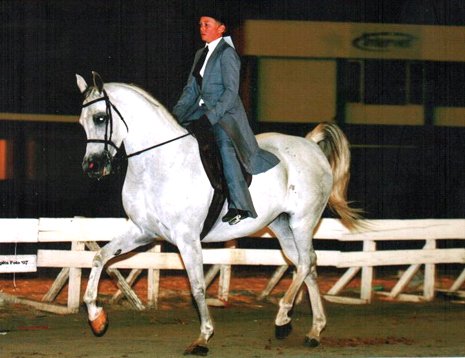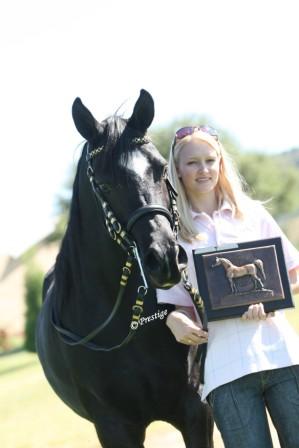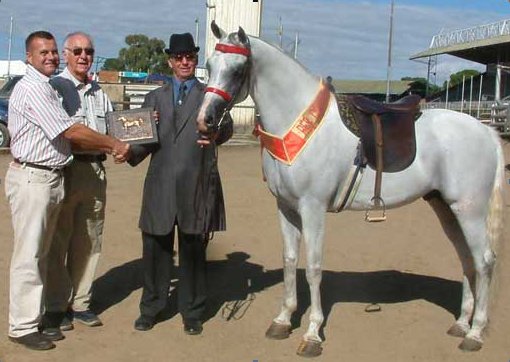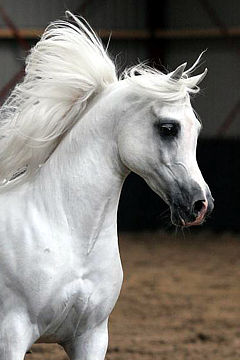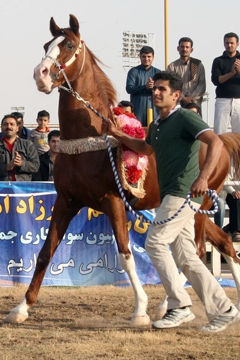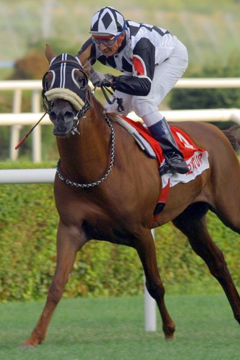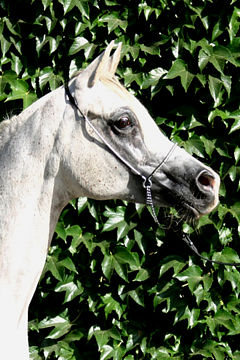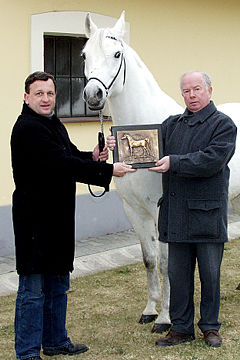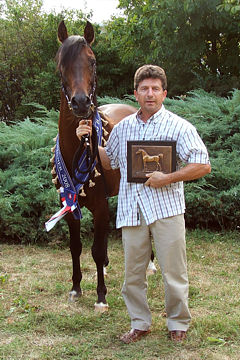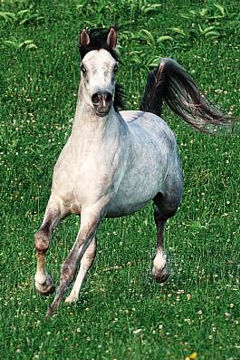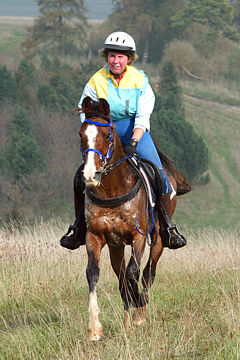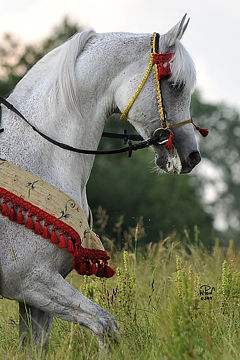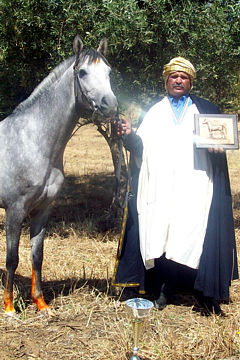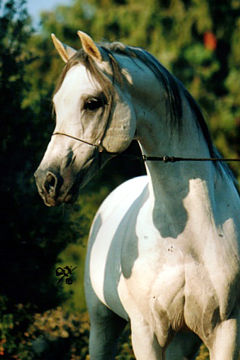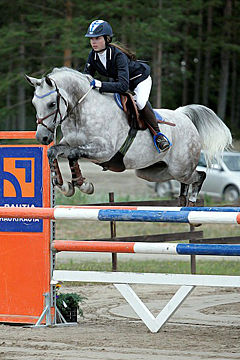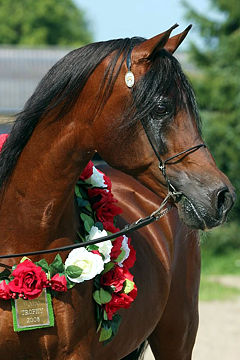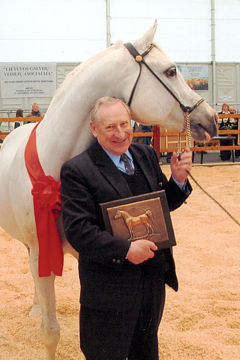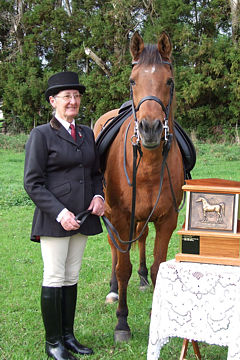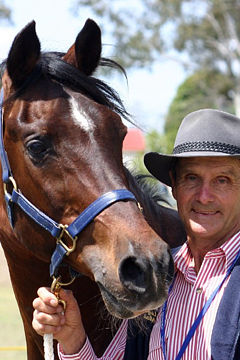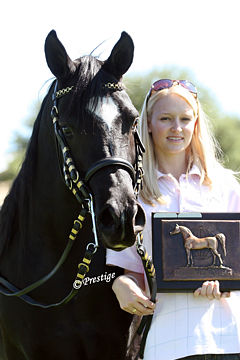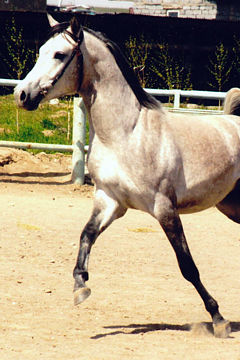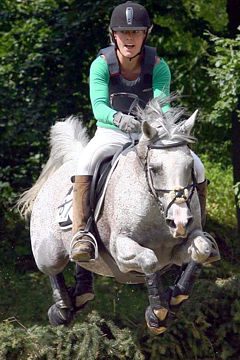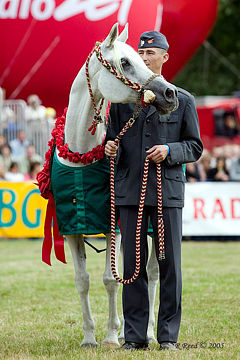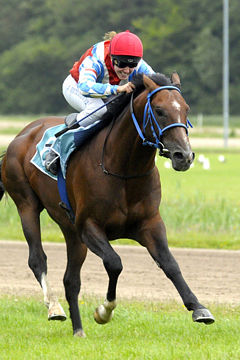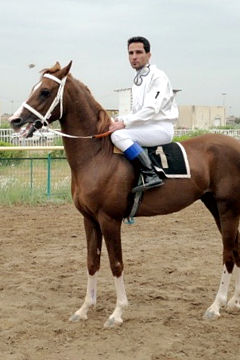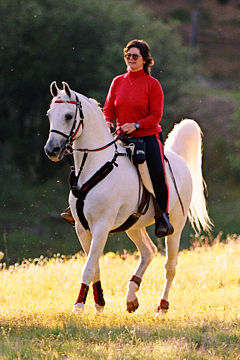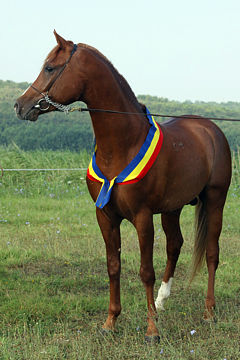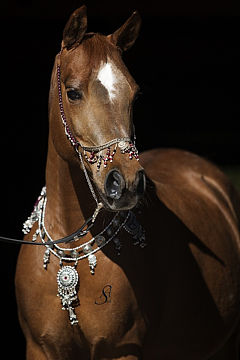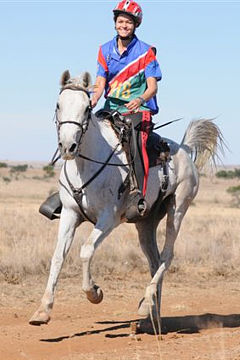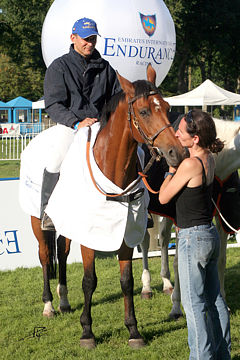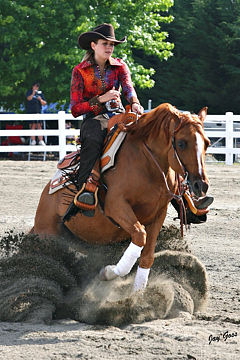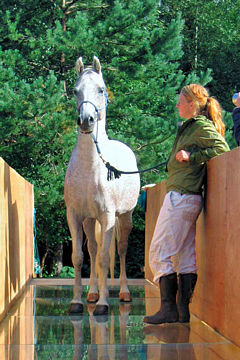![]()
Member Report from South Africa
REPORT MADE AT 2025 WAHO CONFERENCE:
Sunel van der Merwe, South Africa: Dear Heads of Delegates, Esteemed Guests, and Organizing Committee, my name is Sunel van der Merwe and I am the Office Manager for South Africa’s Registry and for our Stud Book. I want to apologise for my co-delegate Mr. Stephanus Buys, our Vice President, who could not be here today. South Africa is one of the 7 founder member countries of WAHO so it is a great honour to stand before you today and present this report on behalf of the South Africa Arabian Horse Registry. Firstly, I would like to extend my heartfelt gratitude to the Emirates Arabian Horse Society and to the entire organizing committee for hosting this Conference.
Despite facing challenges such as severe drought in some areas and economic difficulties in our country, our Registry has shown resilience and growth over the past three years. In 2024, we registered 597 foals, a significant increase from 261 foals in 2023. We also recorded 16 horse imports and 19 exports, reflecting ongoing international interest in our horses.
Artificial Insemination is accepted in South Africa, and stallions must be registered as semen donors. However, Embryo Transfer is conducted on a very limited scale, if at all, due to the high costs involved. Most breeders prefer natural breeding methods, which also contribute to the preservation of South African bloodlines by promoting genetic diversity across multiple mares rather than extracting multiple embryos from a single mare. To be registered as a breeding stallion, the horse must hold a valid negative Contagious Equine Metritis certificate, for natural breeding they must be re-tested every 5 years, and they must also provide a Clinical Certificate confirming fully descended testicles.
Our Registry maintains an online pedigree database through Logix database. South Africa no longer publishes a printed stud book, as the online system provides instant access to pedigrees, performance records, and other essential data.
In South Africa Arabian horses compete across various disciplines, showcasing their versatility. The Registry actively supports these events, including our Annual National Championship Show & two major Shows, featuring halter, ridden classes, dressage and performance classes, and liberty, as well as Open Breeder Shows where Arabians compete against other breeds, further proving their adaptability. Additionally, our Registry actively participates in the South African National Equestrian Schools Association (SANESA), which promotes equestrian sports at the school level across multiple disciplines, including dressage, showjumping, and western riding. This is to encourage youth participation, we have established the AHSSA Floating Trophy for riders competing on registered Arabians, Anglo-Arabs, and Part-Bred Arabs in SANESA Nationals for the following: Endurance horses competing exclusively in endurance, and all other National classes. These trophies recognize excellence and promote Arabian horse participation in endurance events and all other National Classes for our youth.
Endurance riding is particularly popular in South Africa, with over 128 endurance events held annually, governed by the Endurance Ride Association of South Africa (ERASA). While these events are open to all breeds, Arabian horses continue to dominate at the finish line. Currently, 1,051 members and 2,214 active horses participate in endurance competitions nationwide.
The South Africa Arabian Horse Registry actively promotes the Arabian breed through various channels: Newsletters, social media, and website publications, educational seminars and training courses covering breed history, care, welfare, and usage, collaboration with magazines and equestrian organizations . The Registry also makes an annual donation to the Highveld Horse Care Unit to support the welfare of Arabian horses.
This year, we are incredibly proud of our WAHO Trophy winner, Arabesca Scarlet Moon. She has proven to be an extraordinary ambassador for the Arabian breed in South Africa and beyond. Bred by Arabesca Arabians, she is not only a stunning mare but also an exceptional broodmare, consistently passing on her extreme type and elegance to her foals. Her legacy is most beautifully represented by her son, Azzaam Al Amal. What makes Arabesca Scarlet Moon’s achievement even more special is how she has inspired our breeders. As a locally bred mare from a small breeder with a clear vision, she has shown that South African bloodlines can achieve great success. Her story has motivated breeders across the country, proving that with dedication, careful breeding, and passion, even a small breeder can make a significant impact. The recognition of her excellence has encouraging OUR breeders to strive for the highest standards and take pride in their locally bred horses.
In conclusion, I would like to express my appreciation for this opportunity to engage with fellow delegates from around the world. It has been an incredible experience to visit this beautiful country and attend such a prestigious and well-organized Conference. I wish all delegates a productive and insightful meeting, and look forward to continued collaboration in the future. Thank you.
2019 REPORT:
The Arab Horse Society of South Africa has provided the following information. In 2017, 564 foals were registered. 27 horses were exported. There were 8 shows and approximately 100 endurance competitions. In 2018, 448 foals were registered. 3 horses were exported and 3 horses were imported. The number of competitions remained the same.
REPORT MADE AT 2014 WAHO CONFERENCE:
Marie-Louise Van Wyk, South Africa: Mr President, distinguished delegates, ladies and gentlemen, greetings from the President and Council of the Arab Horse Society of South Africa. I am MarieLouise van Wyk, National Council Member of the Arab Horse Society of South Africa, where my portfolio is Studbook and WAHO affairs. Our sincere gratitude is extended to our celebrated and legendary outgoing President, Dr. Hans Nagel, we wish him a well earned retirement. At the same time we welcome our new President, Mr. Peter Pond from Australia. South Africa looks forward to this new era and wishes him all the best for a prosperous and fruitful term of office.
At the present time, we have 774 members of the Arab Horse Society. Since the first volume of our Stud Book was published in 1961, we have registered in the region of 15,000 foals. The number of living purebred Arabian horses at present is 7,807, with 475 mares entered for breeding and 242 stallions. Stallions do not have to be licensed but must be tested for SCID and CA. Approximately 1,000 Partbreds and Anglo-Arabs are also registered. Only 73 foals were registered so far this year. This is a dramatic decline from 563 in 2011, 709 in 2012 and 457 in 2013. This situation has arisen due to three years of severe drought in some areas and the appalling economic state of affairs in our country. 36 horses were imported and 64 horses were exported. Artificial Insemination is accepted and stallions have to be registered as semen donors. There are approximately 30 stallions registered as semen donors. Embryo transfers have only been accepted since July 2008.
Six Regional Shows are held each year with an entry of approximately 150 horses, and a National Championship Show is also held each year and here the entries top 350. Besides the Halter Classes, Riding, Dressage and Performance Classes are an integral part of our shows.
Endurance Riding is extremely popular in South Africa with between 96 and 100 Rides taking place each year. On some weekends, three to four rides are held over one weekend at various venues across the country, the most challenging and arduous being the 210 km Fauresmith Ride. Eleven FEI events were held during the last year. The Endurance Ride Association of South Africa (ERASA) is an independent body governing all Endurance Rides in South Africa. These rides are open to all breeds, but I am happy to report that Arabian horses and their derivatives feature strongly at the finish line.
We are grateful to report that an excellent and friendly rapport exists between the WAHO office and our office in Bloemfontein. Nothing seems to be too much trouble for your amazing Executive Secretary, Katrina Murray. In conclusion I thank you for this amazing experience, to visit this beautiful country and to attend this well organized illustrious Conference in Qatar. I sincerely wish all delegates an interesting and productive Conference. Thank you.
REPORT MADE AT 2009 WAHO CONFERENCE:
I am Marie Louise Van Wyk, Council Member of the Arab Horse Society of South Africa, where my portfolio is Stud Book and World Affairs.
At the present time, we have 720 Society members. Since the first volume of our stud book was published in 1961, we have registered in the region of 15,000 foals. The number of living purebred Arabian horses is 5,982, with 3,850 mares entered for breeding and 1,633 stallions. Stallions do not have to be licenced but must be tested for SCID. 1,084 Partbreds and Anglo-Arabs are also registered. 2,176 foals were registered since our last WAHO meeting. 90 horses were imported in that time and approximately 150 horses were exported. Artificial Insemination is accepted and stallions have to be registered as semen donors. There are approximately 30 stallions registered as semen donors in South Africa. Embryo Transfers have only been accepted since July 2008 and since that time 90 applications for registration of Embryo Transfer foals have been received.
I am very proud to report that I bring to this Conference Volumes 16 – 32 of our stud book. This brings the South African stud books up to date until 2007. A CD of our stud books is available.
5 Regional Shows are held each year with an entry of approximately 150 horses, and a National Championship Show is also held each year and here the entries top 350. Besides the Halter classes, Riding, Dressage and Performance classes are an integral part of all our shows.
Endurance riding is extremely popular in South Africa with 67 rides taking place each year, on some weekends three to four rides are held over one weekend at various venues across the country, the most challenging and arduous being the 210Km Fauresmith Ride. The Endurance Ride Association of SA (ERASA) is an independent body governing all Endurance Rides. These rides are open to all breeds, but I am happy to report that Arabian horses and their derivatives feature strongly at the finish line.
I must not fail to mention the excellent rapport which exists between the WAHO office and our office in Bloemfontein. Nothing seems to be too much trouble for your Executive Secretary, Katrina Murray, for which we say thank you. In conclusion I thank you for this amazing experience to visit the beautiful country of Oman, and to attend to attend this well-organized, illustrious Conference and I sincerely wish all delegates an interesting and productive Conference. I would like to thank His Majesty Sultan Qaboos Bin Said, The Royal Court Affairs, and the Organizing Committee for hosting this Conference. Thank you.
REPORT MADE AT 2007 WAHO CONFERENCE:
South Africa is one of seven founder member countries of WAHO. The Arab Horse Society of South Africa was founded in 1960 by the late Charmaine Grobelaar and Jani Grobelaar. A book on the history of the Arabian in South Africa is currently in print which will give the history of the Arabian in our country going back to 1652.
The Society has currently 597 paid up members who own 4,912 horses of which 3,184 are mares, 1,450 stallions and 278 geldings. 750 purebred foals were registered in 2005. Anglo-Arabs and Partbred Arabs are also recorded by Society and numbered 202 foals born for the current year. In 2006 no horses were exported, while 10 were imported. DNA testing is done routinely and is mandatory. Mechanisms and knowledge exist to utilize Artificial Insemination and Embryo transfer which are both allowed. The management of the Society is handled by council and a series of sub-committees under the headings of actions, showing, sponsorship, finance, studbook, promotion and drug testing. This is all under the chairmanship of the current President, Mr. Johan Du Plessis.
Over the years the primary activity was showing classes, with one annual National Championship. This is continuing but with an extension into endurance riding which is the latest and fastest growing equestrian sport in South Africa. There are multiple 80km competitions through which one qualifies for the ultimate 201km Fouresmith competition, which this year saw 348 competitors. Endurance riding is subdivided into senior and junior riders, with qualification for national and provincial levels. Single competitors compete in categories for children (10-13 years), juniors (14-17 years) and seniors (over 18 years). This latter group is sub-divided again according to weight carrying, i.e. lightweight (below 73 kg), standard (73-94 kg) and heavyweight (95 kg and over). Endurance riding is not the sole domain of Arabians, yet in open company they often dominate. Veterinarians check all horses every 25 kilometres and the Fouresmith ride is completed over 3 days. A more strenuous ride over 100 miles is done once a year by competitors over 24 hours, starting at midnight.
Visiting judges from overseas are at times invited to give seminars after judging. Our stud books are up-to-date.
In 2007, South Africa registered 1,042 foals, an encouraging increase on previous years. 12 horses were exported and 59 were imported.

